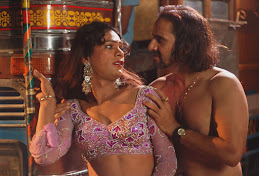(Audience reactions from the couple of previews held recently)
“The film is a sensitive and touching portrayal of marginalized communities.”
~ Dr. Rajeev Jerajani, psychiatrist
“I screen hundreds of films in this preview theatre but hardly watch them. Today, I just started watching and saw the entire film and had tears in my eyes.”
~ Projectionist, Star preview theatre, Mumbai
“Your film is a slap on the face of society.”
~ Gitanjali Dhulekar, a viewer
“Good Job…Good Performances”
~ Bindu Madhav Khire, Samapathik Trust, Pune
“Excellent Performances”
~ Sujal, a viewer
“Good Potential for mainstream”
~ Sanjay Thakur, a viewer
“Outstanding”
~ Kevin Menezes, a viewer
“I had actually come to attend another function at this venue but I did not leave the auditorium when I started seeing this film even though I realized my mistake. The film says a lot about HIV positive people.”
~ a viewer
“Never realized that people like Umrao exist in society. Umrao’s character is amazing.”
~ Avinash Mehto, Head of Avi Creations, an edit set-up
“The film was so compelling that I had to come for the second screening too”
~ Abhijit Aher, a viewer
“This film has inspired me and I want to become a counselor.”
~ Umang Sheth, a viewer
“For the first time, there’s a film that recognizes the efforts of counselors.”
~ Kalpita Patil-Lanjekar, a counselor
“In one stroke, you have made counselors more important than doctors and destroyed the myth that only doctors can help”
~ Dr. Maninder Setia, Ph.D. student at McGill University, Montreal
“The discrimination shown in the film is so real. We have seen it all and lived it all.”
~ Dr. Hemangi Jerajani, Head of the Department, Skin and Dermatology, LTMG Hospital, Mumbai
“A sensitive portrayal of a real-life counselor and a true profile of a TISS student.”
~ Brinelle D’Souza, professor, Tata Institute of Social Sciences, Mumbai
“Extremely touching and sensitive, the film deals with issues of HIV positive people in a real manner.”
~ Rita Sonawat, Head of the Department, Human Development, SNDT University, Mumbai
“I am grateful to Rita m’am for bringing me along to watch this film. It should be made mandatory viewing for all youth in the country.”
~ a student of SNDT University
“There are many times when I have gone home from work and cried for the pain of my counselees. And this film reflects my feelings.”
~ Rajashree, a counselor
“V. Good ! an eye opener ! Good educational film”
~ Kanchan Karani, a viewer
“The film is an eye-opener to the kind of good work being done with HIV positive people.”
~ Rekha Shah, a viewer
“Four years of my life flashed in front of my eyes. I thought I was reliving my life at Humsafar once again.”
~ Vrushali Deshmukh, ex-counseling head at The Humsafar Trust, Mumbai, the woman on whose experiences the film is based
Wednesday, August 15, 2007
Public Voices
Posted by
68 Pages - the film
at
11:43 PM
![]()
Subscribe to:
Post Comments (Atom)
















3 comments:
'De Javu'is all that comes to my mind when I think of '68 pages'
who am i to make comment on such a excellent movies but really this films makes me cry, it shows the real life of sex workers as well as msm community, on which no body will speak and express our view, only we have to take the lead in such a noble cause. our alimghty bestows for all HST team work.
Mahesh Shinde, Thane
I got an opportunity to be part of screening of the film “68 Pages”
It is a unique experience revealing true life picture of the HIV epidemic. The story captures the life of five different individuals who are HIV positive and presents the trauma of their lives and also the trauma faced by one woman who is trying to make difference in their lives. It was an eye opener since I have interacted with HIV positive people very closely. The film creates a perfect balance between drama and light scenes that ensures audience’s attachment with the characters and you become more concerned about their lives.
Some may feel that its not commercial cinema but I would rate it as an intelligent commercial cinema. I would be bothered about the success of this movie since it has immense capacity to make valuable difference in lives of general population and professionals.
A melodies song of the movie (Nikle the akele ab sang kitne paao hai) acts as an anchor and takes you on a journey of happiness, concerns, worries and the decisions that each character made from starting to end. This movie touches several aspects like complications in relationships as they are not open, unspoken and hidden human bonding, importance of psychosocial support and positive living.
Sridhar and Vivek as story writers have carefully developed the graph for each character. The performances of the actors were quite convincing and special kudos to Jayati Bhatia for bringing inner most feelings of a prostiture along with cross Dresser (Uday), counselor (Mauli Gangurly), and the gay couple (Joy and Sherrin ) The dialogues were meaningful. Especially when the cross dresser tells the Counselor “Pyar to sabko mangta hai naa” or the prostitute expresses her desire “Doctor to nahi banaaongi, usey to main aap jaisa banaungi!”. The film does not stereotype the gay couple or make mockery of the cross dresser. The roles are devised close the real life individuals.
The movie not only creates an awareness about the trauma of HIV postive people also gives hope to fight with the disease and lead a normal life.
In today’s world with so much stress and tension the film talks about each one of us having a “worry tree” like Mansi’s Diary and her 68 Pages
Post a Comment